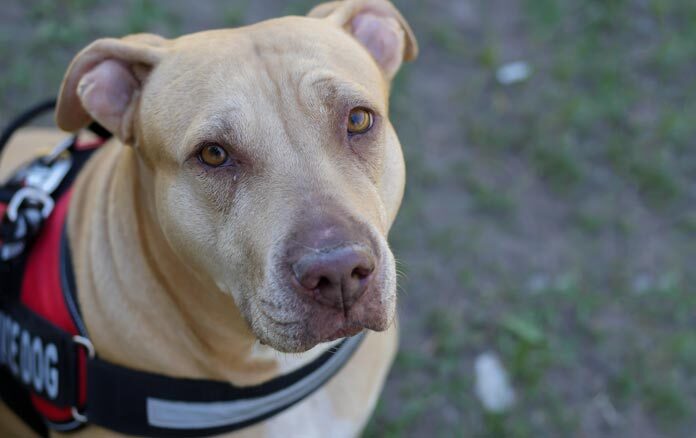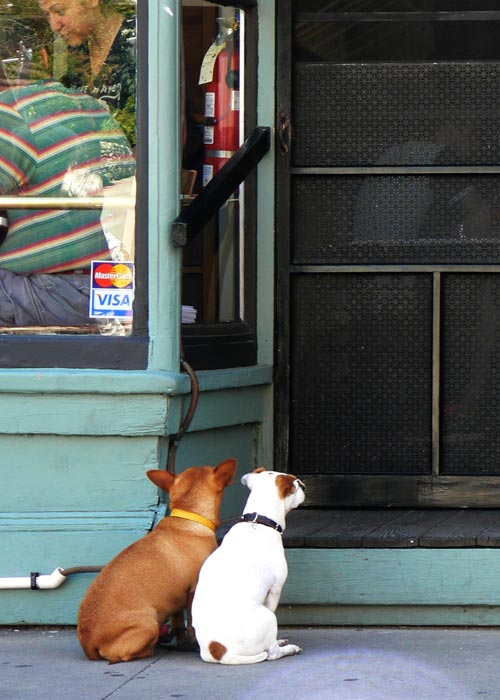
Article contributed by Matthew C. Berger
If you’re like us, you’ve seen countless articles and stories in the news recently about the literal menagerie of animals taking to the air with their humans on airlines and boarding with their humans in apartment buildings as “emotional support animals.” You may, then, be forgiven for asking yourself, “if these animals are allowed on planes and in apartments, do I need to allow them into my restaurant, too?”
Fear not, for even though federal and New York state and city laws offer patrons of public accommodations—which include restaurants and dining establishments—significant latitude with their service animals, it is unlikely your customers will be forced to dine next to an emotional support peacock, squirrel, or rabbit any time in the near future.
However, it is likely that you have, or will soon, be faced with a customer seeking to enter your restaurant with a dog.
Are you required to allow the dog into your restaurant?
How do you know if the dog is actually a “service dog?”
What are your obligations and rights as a restaurant owner when it comes to allowing dogs entrance into your business?
To help you navigate the different laws governing service dogs, the answers to these questions are discussed below.
What is a “Place of Public Accommodation”?
Here in New York City, admittance of “service” animals—not pets or emotional support animals—to places of public accommodation is governed by federal law (the Americans with Disabilities Act (“ADA”)), state law (the New York State Human Rights Law (“NYSHRL”)), and city law (the New York City Human Rights Law (“NYCHRL”)).
Public accommodations include, but are not limited to, restaurants, hotels, theaters, medical or dental offices, pharmacies, retail stores, grocery stores, museums, libraries, parks, schools, gyms, day care centers, banks, hair salons, taxis, factories, warehouses, and office buildings.
Under the ADA, the NYSHRL, and the NYCHRL, a place of “public accommodation” is generally defined as (1) a private entity that owns, operates, leases, or leases to, a place of public accommodation, (2) a provider, whether licensed or unlicensed, of goods, services, facilities, accommodations, advantages or privileges of any kind, and a place, whether licensed or unlicensed, where goods, services, facilities, accommodations, advantages or privileges of any kind are extended, offered, sold, or otherwise made available, or (3) a non-residential commercial facility whose operations affect commerce.

Must a Restaurant Allow Service Dogs?
Yes, unequivocally. Under the ADA, the NYSHRL, and the NYCHRL, places of public accommodation, including restaurants, are prohibited from discriminating against individuals with disabilities or perceived disabilities (whether the disability is physical, sensory, psychiatric, intellectual, or any other mental disability) or denying admittance to and/or the equal use and enjoyment of any public facility because an individual has a disability.
Accordingly, restaurants must allow individuals with disabilities to bring their service dogs onto the business premise in all areas customers are generally allowed or the public is invited (even if the restaurant has a “no pets” policy or animals are prohibited by state or local health codes). Additionally, restaurants must admit service dogs for free; they may not impose any deposit, fee, or surcharge to admit a service dog, although a fee may be imposed if the service dog causes damage (as long as the restaurant charges non-disabled customers for the same type of damage).
However, the restaurant is not responsible for the care or supervision of the service dog, nor is it required to provide food or a special location for the animal. Further, restaurants may exclude or remove a service dog if it misbehaves in a manner that poses a threat to the health or safety of others, such as if the dog urinates or defecates indoors, or menaces or bites at other patrons (and the disabled patron is unable to control it).
If, however, a service dog must be excluded or removed from the premises, the restaurant should give the individual with a disability the option of continuing to enjoy the goods or services without having the animal on the premises, or find an alternative for the individual, such as, for example, offering take out from the restaurant.
How Do I Know If a Dog is Truly a “Service Animal”?

While some service dogs wear special collars or harnesses (all easily purchased on Amazon), and others have identification papers (again, easily obtained for purchase online), individuals are not required to carry documentation for their service dog, and restaurants may not require documentation or proof that the dog is a trained service animal before admitting the service dog onto its premises.
So how, then, can you be sure the dog is a trained service animal?
The short answer is you can never be 100% sure.
However, there are two and only 2 questions that a restaurant may ask an individual who seeks admittance with a service dog:
(1) is the animal required because of a disability; and
(2) what work has the animal been trained to perform?
If the individual responds “yes” to the first question and credibly describes the services performed by the dog to alleviate some aspect of his or her disability, the patron and the dog must be admitted.
While the tasks that service dogs are trained to perform are many, generally service animals are trained to perform work or tasks directly related to the individual’s disability, such as:
- Assisting with navigation (blindness)
- Assisting with stability and balance (mobility impairments)
- Alerting individuals to sounds (deafness) or allergens
- Pulling wheelchairs
- Carrying and retrieving items (mobility impairments)
- Seizure assistance
- Interrupting impulsive or destructive behaviors (psychiatric and neurological disabilities)
While this list is not all-encompassing, the common theme is that the dog is trained to perform a specific, defined task or tasks related to a disability. Accordingly, “comfort” or “emotional support” dogs that are used for emotional support, well-being, comfort, or companionship do not fall within the definition of a “service animal” and are therefore not required to be admitted to the restaurant.
It may be daunting the first time you need to make a judgment call on whether to admit a service dog, but as long as you understand that federal, state, and city law offer broad protections to individuals with disabilities, and you remember the two questions you are permitted to ask, you will find the process less intimidating than it appears. And when in doubt, err on the side of admitting customers with service dogs, as the fines for violations of the ADA, NYSHRL, and/or NYCHRL can be steep.
For more information about this article, advice and counsel regarding your rights and responsibilities as a public accommodation provider, or for service animal training for your employees, please contact Carolyn D. Richmond at 212.878.7983 or crichmond@foxrothschild.com, Glenn S. Grindlinger at 212.905.2305 or ggrindlinger@foxrothschild.com, Matthew C. Berger at 646.601.7658 or mberger@foxrothschild.com, or any other member of Fox Rothschild LLP’s Labor & Employment Department. Visit us on the web at Foxroths Child.























